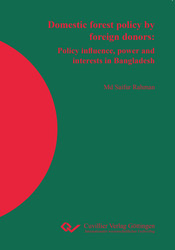| Areas | |
|---|---|
| Serie de libros (97) |
1381
|
| Nachhaltigkeit |
3
|
| Gesundheitswesen |
1
|
| Letra |
2370
|
| Ciencias Naturales |
5407
|
| Matemática | 228 |
| Informática | 319 |
| Física | 980 |
| Química | 1364 |
| Geociencias | 131 |
| Medicina humana | 243 |
| Estomatología | 10 |
| Veterinaria | 108 |
| Farmacia | 147 |
| Biología | 835 |
| Bioquímica, biología molecular, tecnología genética | 121 |
| Biofísica | 25 |
| Nutrición | 45 |
| Agricultura | 1005 |
| Silvicultura | 201 |
| Horticultura | 20 |
| Ecología y conservación de la tierra | 148 |
| Ciencias Ingeniería |
1798
|
| General |
98
|
|
Leitlinien Unfallchirurgie
5. Auflage bestellen |
|
Erweiterte Suche
Domestic forest policy by foreign donors (Tienda española)
Policy influence, power and interests in Bangladesh
Md Saifur Rahman (Autor)Previo
Indice, PDF (77 KB)
Lectura de prueba, PDF (190 KB)
Following internationalisation, the influence of non-domestic actors on domestic policy processes has been rising, and diverse actors and institutions have started to extend their influence beyond state borders. The study attempts to analyse how do foreign donors influence domestic policy making process as well as gain power and serve interests employing Bangladeshi forest policies. The study established the idea that donor funding can have an impact on domestic policy changes. In its political process, specific donor (USAID) may build coalition with non-state actors at all level circumventing national bureaucracies to fulfill their desired political interests. They use prominent policy issues like forest biodiversity and climate change to gain particularly incentives and dominant information power capability. Furthermore, in allocating their development aid foreign donor organizations (USAID, GIZ and EU) simultaneously to their formal development-oriented interests, pursue informal political, economic and strategic self-interests.
| ISBN-13 (Impresion) | 9783736994737 |
| ISBN-13 (E-Book) | 9783736984738 |
| Formato | A5 |
| Idioma | Inglés |
| Numero de paginas | 232 |
| Laminacion de la cubierta | Brillante |
| Edicion | 1. Aufl. |
| Lugar de publicacion | Göttingen |
| Lugar de la disertacion | Göttingen |
| Fecha de publicacion | 10.02.2017 |
| Clasificacion simple | Tesis doctoral |
| Area |
Silvicultura
|
| Palabras claves | Development aid, foreign donor bureaucracies, power capability, national bureaucracies, formal and informal interests, forest policy, Bangladesh |








